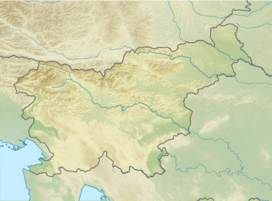Mount Saint Mary
| Mount Saint Mary | |
|---|---|
 View of Mount Saint Mary from Castle Hill | |
| Highest point | |
| Elevation | 676 m (2,218 ft) |
| Coordinates | 46°7′47″N 14°27′49″E / 46.12972°N 14.46361°E |
| Naming | |
| Native name | Šmarna gora (Slovene) |
| Geography | |
Mount Saint Mary[1][2][3] (Slovene: Šmarna gora, German: Großkahlenberg[4][5]), originally known as Holm,[6][7] is an inselberg in the north of Ljubljana, the capital of Slovenia. The mountain is part of the city's Šmarna Gora District. It is the highest hill in the city and a popular hiking destination.[8][9]
The two-peaked mountain resembles the humps of a Bactrian camel or woman's breasts,[10] and it has two peaks: Mount Saint Mary (Šmarna gora; 669 metres, 2,195 ft) to the east and Grmada (676 m, 2,218 ft) to the west.
The toponym contains the archaic contraction Šmarna for Sveta Marijina 'St. Mary's'. The name of the western peak, Grmada, literally means 'heap, pile (of wood for a bonfire)'. The slightly lower eastern peak lends its name to the mountain as a whole.
In clear conditions, the mountain offers a view across much of Slovenia, from Mount Triglav and Mount Stol on the northeastern Austrian–Italian border to Mount Krim, Mount Snežnik, and Trdina Peak (Slovene: Trdinov vrh) on the Croatian border to the southwest. Nearby hills include Bare Hill (Golo brdo), Tošč Face (Toško čelo), Rožnik, and Rašica.
The hill is surrounded by the villages of Vikrče and Spodnje Pirniče to the west, Zavrh pod Šmarno Goro to the north, and the former villages (now part of Ljubljana) of Šmartno pod Šmarno Goro and Tacen to the southeast.
The southern slope of the mountain is wooded with downy oak and hop hornbeam, while the northern slope is covered by a beech forest.
The bell tower on the top of the mountain rings each day half an hour before midday.[11]
References
[edit]- ^ Bratina Jurkovič, Nataša. 2014. "Perception, Experience and the Use of Public Urban Spaces by Residents of Urban Neighbourhoods". Urbani izziv 25(1): 107–125, p. 117.
- ^ Osti, Josip (2018). All Loves Are Extraordinary. Columbus, OH: Gatekeeper. ISBN 9781642372465. Retrieved November 2, 2018.
- ^ Owen, Erika (August 5, 2016). "20 One-Week Vacations to Take Between Jobs". Travel & Leisure. Meredith Corporation. Retrieved November 2, 2018.
- ^ Laibach (map, 1:75,000). 1918. Vienna: K.u.k. Militärgeographisches Institut.
- ^ Leksikon občin kraljestev in dežel zastopanih v državnem zboru, vol. 6: Kranjsko. 1906. Vienna: C. Kr. Dvorna in Državna Tiskarna, p. 115.
- ^ Badjura, Rudolf (1953). Ljudska geografija: terensko izrazoslovje. Ljubljana: Državna Založba Slovenije. p. 117.
- ^ "About Šmarna gora". Šmarna gora. Retrieved 6 September 2015.
- ^ "Settlements: Ljubljana". Geopedia.si. Retrieved 30 January 2012.
- ^ Burger, Boštjan. "Šmarna gora". Slovenia-Landmarks. Retrieved 30 January 2012.
- ^ "Gora na pragu Ljubljane" [The Mountain at the Threshold of Ljubljana] (PDF). Varna Pot (in Slovenian). 12 (4). Svet za preventivo in vzgojo v cestnem prometu Mestne občine Ljubljana. December 2012. ISSN 1580-6995.
Njena vrhova spominjata na grbo dvogrbe kamele, marsikoga pa na žensko oprsje.
- ^ "Smarna gora". www.smarnagora.com. Retrieved 2016-04-13.
External links
[edit]- Mount Saint Mary website
 Media related to Mount Saint Mary at Wikimedia Commons
Media related to Mount Saint Mary at Wikimedia Commons

